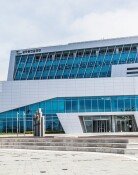Over 40% of new Covid-19 cases produced in non-metropolitan regions
Over 40% of new Covid-19 cases produced in non-metropolitan regions
Posted July. 27, 2021 08:29,
Updated July. 27, 2021 08:29
The fourth wave of COVID-19 is yet to be controlled in South Korea. Even though fewer people got tested on Monday, 1,318 new cases were confirmed, which was the highest record on Monday. While the spread of the virus has slowed down in Seoul and nearby regions thanks to the last two weeks of Level 4 social distancing guidelines, more and more patients are confirmed in non-metropolitan regions, accounting for over 40 percent of daily cases in the country.
The government decided to extend the current level of social distancing guidelines in Seoul and nearby regions for two weeks and implement Level 3 guidelines in the rest of the country. Cities with rapidly increasing cases, including Daejeon and Gimhae, will be subject to Level 4 guidelines. Whether the spread of the virus will be contained is unclear, however. More than one out of two new patients are infected with the Delta variant, which is 2.4 times more contagious than the original virus. This means that the same level of social distancing as before won’t be enough to catch up with the speed of viral spread. Moreover, the holiday season of the country from late July to early August is accelerating country-wide infections as many people head to tourist attractions.
In the end, infections in the Seoul metropolitan area have expanded across the country due to the government’s failure to address concerns about the balloon effect in non-metropolitan regions and the spread of the Delta variant. The disease control authorities believe that this week will be critical to how long the fourth wave will last. Unless the number of new daily patients starts to stabilize, efforts stricter than Level 4 guidelines may be required across the country. While residents in regions that have dutifully implemented efforts to control the virus may feel frustrated by the blanket measure, all-out efforts are required at the moment. Basic rules to control the virus – avoiding unnecessary travel, wearing a mask, ventilating indoor spaces – should be observed.
Large-scale vaccination resumed for those in their 50s on Monday after a period of suspension. As there are some issues with the supply of Moderna, which was the main vaccine to be supplied in the second half of the year in South Korea, it is unclear which vaccine will be administered to those scheduled for early August. The target to administer the first dose of vaccines to 70 percent of all population by September should be achieved as early as possible by frequently checking the vaccine supply schedule.
Headline News
- N. Korea launches cyberattacks on S. Korea's defense companies
- Major university hospital professors consider a day off each week
- Italy suffers from fiscal deficits from ‘Super Bonus’ scheme
- Inter Milan secures 20th Serie A title, surpassing AC Milan
- Ruling and opposition prioritize spending amid tax revenue shortfalls







